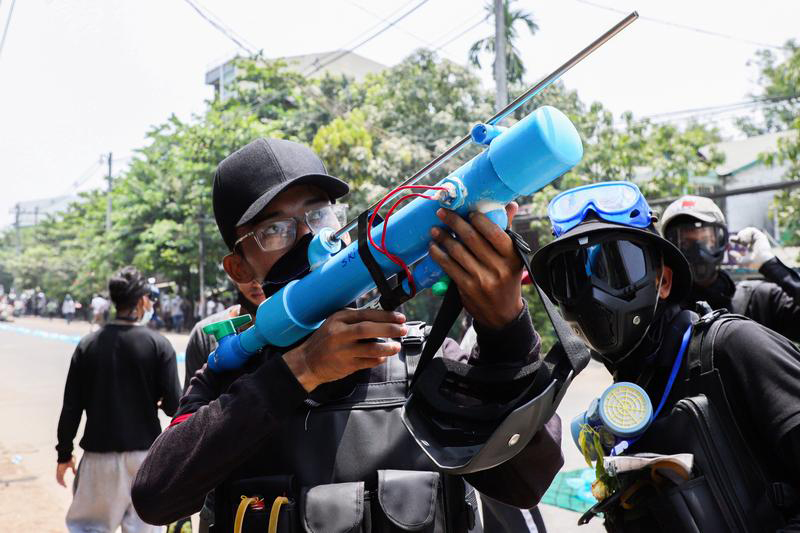(Reuters) – Myanmar security forces killed 114 people, including some children, in a brutal crackdown on pro-democracy protesters on Saturday, the bloodiest day of violence since last month’s military coup, news reports and witnesses said.
The killings, which took place on Armed Forces Day, drew strong renewed criticism from Western countries. British Ambassador Dan Chugg said the security forces had “disgraced themselves” and the U.S. envoy called the violence horrifying.
Military jets also launched air strikes on a village in territory controlled by an armed group from the Karen ethnic minority and at least two people were killed, a civil society group said.
Earlier, the Karen National Union said it had overrun an army post near the Thai border, killing 10 people – including a lieutenant colonel – and losing one of its own fighters as tensions with the military surged after years of relative peace.
Senior General Min Aung Hlaing, the junta leader, said during a parade to mark Armed Forces Day that the military would protect the people and strive for democracy.
Demonstrators turned out on Saturday in Yangon, Mandalay and other towns, as they have done almost daily since the Feb. 1 coup that ousted elected leader Aung San Suu Kyi.
The Myanmar Now news portal said 114 people were killed across the country in crackdowns on the protests.
At least 40 people, including a 13-year-old girl, were killed in Mandalay, and at least 27 people were killed in Yangon, Myanmar Now said. A boy as young as five was earlier reported among the dead in Mandalay but there were conflicting reports later that he may have survived. Another 13-year-old was among the dead in the central Sagaing region.
“Today is a day of shame for the armed forces,” Dr. Sasa, a spokesman for CRPH, an anti-junta group set up by deposed lawmakers, told an online forum.
A military spokesman did not respond to calls seeking comment on the killings by security forces, the air strikes or the insurgent attack on its post.
“They are killing us like birds or chickens, even in our homes,” said Thu Ya Zaw in the central town of Myingyan, where at least two protesters were killed. “We will keep protesting regardless… We must fight until the junta falls.”
The deaths on Saturday would take the number of civilians reported killed since the coup to over 440.
U.S. Ambassador Thomas Vajda said on social media: “This bloodshed is horrifying,” adding “Myanmar’s people have spoken clearly: they do not want to live under military rule”.
British foreign minister Dominic Raab said the killing of unarmed civilians and children marked a new low, while the EU delegation to Myanmar said Saturday would “forever stay engraved as a day of terror and dishonour.”
News reports said there were deaths in Sagaing, Lashio in the east, in the Bago region, near Yangon, and elsewhere. A one-year-old baby was hit in the eye with a rubber bullet.
Min Aung Hlaing, speaking at the parade in the capital Naypyitaw, reiterated a promise to hold elections, without giving any time-frame.
“The army seeks to join hands with the entire nation to safeguard democracy,” he said in a live broadcast on state television. “Violent acts that affect stability and security in order to make demands are inappropriate.”
The military has said it took power because November elections won by Suu Kyi’s party were fraudulent, an assertion dismissed by the country’s election commission. Suu Kyi remains in detention at an undisclosed location and many other figures in her party are also in custody.
New U.S. and European sanctions this week increased external pressure on the junta, but the condemnation is not universal.
Russia’s deputy defence minister Alexander Fomin attended the parade in Naypyitaw, having met senior junta leaders a day earlier.
“Russia is a true friend,” Min Aung Hlaing said.
Diplomats said eight countries – Russia, China, India, Pakistan, Bangladesh, Vietnam, Laos and Thailand – sent representatives, but Russia was the only one to send a minister to the parade on Armed Forces Day, which commemorates the start of the resistance to Japanese occupation in 1945.
Support from Russia and China, which has also refrained from criticism, is important for the junta as those two countries are permanent members of the United Nations Security Council and can block potential U.N. actions.
In a warning on Friday evening, state television said protesters were “in danger of getting shot to the head and back”. It did not specifically say security forces had been given shoot-to-kill orders and the junta has previously suggested some fatal shootings have come from within the crowds.
Gunshots hit the U.S. cultural centre in Yangon on Saturday, but nobody was hurt and the incident was being investigated, U.S. Embassy spokesperson Aryani Manring said.
Author and historian Thant Myint-U wrote on Twitter: “Even after weeks of appalling violence, today’s killing of civilians is shocking both in nature and scale, with again children amongst the dead, and deserves the world’s concerted attention and help.”






